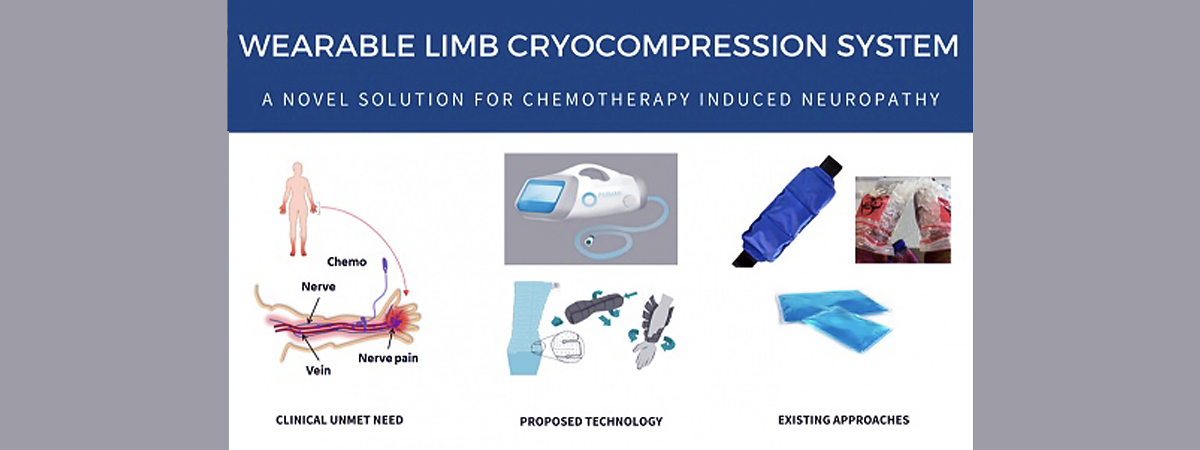The two-year 'Knowledge Transfer Partnership' between the University and Paxman will design and develop a medical cooling system for the prevention of Chemotherapy-induced peripheral neuropathy (CIPN), a common, dose-limiting side-effect experienced by 30%-40% of patients receiving chemotherapy for cancer of which no effective prevention and treatment strategies currently exist
A NEW project, between the University of Huddersfield and a local business who is a global leader in the scalp cooling technology that can reduce chemotherapy-induced hair loss, is to now develop a novel medical device to be used during chemotherapy treatment that could have the potential to benefit a further 1.4 million patients globally and over 30,000 in the UK annually.
The two-year 'Knowledge Transfer Partnership' between the University and Paxman will design and develop a medical cooling system for the prevention of Chemotherapy-induced peripheral neuropathy (CIPN), a common, dose-limiting side-effect experienced by 30%-40% of patients receiving chemotherapy for cancer of which no effective prevention and treatment strategies currently exist.
CIPN causes progressive and often irreversible pain or sensitivity in the hands and feet of patients undergoing chemotherapy leading to delays and discontinuation of treatment.
It contributes to long-term poor patient well-being and significantly increases economic burden in terms of healthcare costs. The condition also leads to losses in work productivity, as affected patients are unable to return to work quickly.
Human-centred Design
The partnership will involve a KTP Associate, supervised by the University's Dr Omar Heurta Cardoso, who will work in new product development with experts from the School of Arts and Humanities, and senior product managers of Paxman, to create a new innovative medical device using product/industrial design experience and a wide range of 'human-centered design' approaches.
Recently, cryotherapy (or cooling) of the limbs during chemotherapy demonstrated a protective effect by preventing/reducing CIPN severity. However, the currently used frozen gloves or ice packs are not user-friendly, deliver unstable cooling and can cause severe frostbite. The research stated there was a need for a medical device to be developed which patients could use in a chemo suite and that would deliver stable cooling, tolerable over the entire duration of the chemotherapy.
Ultimately, the project will generate a CIPN-prevention system ready for clinical trials and medical approval, which will be pursued after the KTP, before full commercialisation of the device.
 Utilising a human-centred design (HCD) approach, this KTP will support the development of a new and world-first cryo-compression device dedicated to CIPN prevention, which integrates a miniaturised medical-cooling system with wearable accessories also known as limb wraps
Utilising a human-centred design (HCD) approach, this KTP will support the development of a new and world-first cryo-compression device dedicated to CIPN prevention, which integrates a miniaturised medical-cooling system with wearable accessories also known as limb wraps Knowledge Transfer Partnerships
This is the third KTP between the University and Paxman and builds on previous highly successful collaborations, bringing together Paxman Coolers Ltd, the World-leaders in scalp-cooling and the expertise of the University of Huddersfield. This is the second KTP collaboration with the award-winning product design team led by Dr Ertu Unver, the Academic Lead of this project and a member of the University's Paxman Scalp Cooling Research Centre which opened in February 2019.
The last KTP was so successful it was graded as 'Outstanding' by Innovate UK, which is the highest award possible and the KTP Associate from the award-winning partnership is to oversee this next project.
"We're thrilled to be working with the University on a new KTP and it's great to see our previous associate, Jonny, now taking the role of the company supervisor," said Paxman CEO Richard Paxman.
"The new project will address an unmet clinical need, mitigating other side effects of chemotherapy, whilst paving the way and enabling us to expand our product range. The 'Human Centred Design' approach that will be embedded in the organisation is a great fit with the Paxman ethos," he said.
- KTPs are part-funded by the Government-backed body Innovate UK. As part of the Government's Industrial Strategy, they drive productivity and economic growth by supporting businesses to develop and realise the potential of new ideas, including those from the UK's world-class research base






